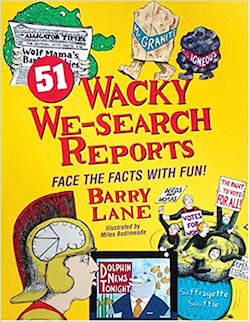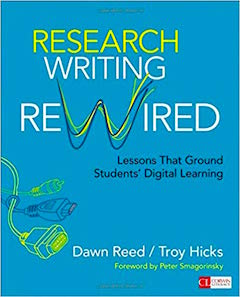Making Student Research More Fun and Efficient
A MiddleWeb Blog
A late night in the library was not uncommon for me while completing my undergraduate degree 20 years ago. I can distinctly remember being in the quietest part of the stacks, trying to figure out how I was going to complete my 10-12 page research paper a week before it was due. Looking back, finding the resources I needed all seemed so straightforward.
The evolution of student research
There is no doubt doing research and completing a research paper has changed significantly from when I was doing it in the late 90’s and early 2000’s. Students don’t necessarily have to spend time looking through a card catalog, writing down the call numbers of books, or going on a physical scavenger hunt in the library for the sources. Those long nights of looking through microfilm are gone for good.
Today a student can simply go to Google and have millions of resources at their fingertips. Seems wonderful, but then I ask myself:
How would I have felt when I was a middle school student if I’d had literally millions of resources at my fingertips? There’s no doubt – I would have been more than overwhelmed.
Even as a 20-year old undergrad, I had the oppressive feeling I would never get through all of the books stacked around me. Honestly, I never did read through every single source, and on any given paper I had 15-20 citations. Perhaps I missed that many more, but there certainly weren’t the millions of options students have now.
So many sources take way too much time
So what am I trying to get at with this lengthy introduction? There are two things that concern me about middle schoolers doing research.

►Second, how can students determine credibility in a timely fashion? With the rigors of today’s courses of study, it is difficult to dedicate 4-5 weeks to research when other parts of the curriculum are being ignored. I am not suggesting we skip the research paper; but when we consider the digital literacies involved, it is clearly a time-consuming endeavor.
In my opinion, many middle school students are going to try to find the “easiest” way of doing things. Even for the most dedicated students, sometimes plagiarism may seem reasonable, given the amount of information they must sift through in the short time we’re able to give them.
Humor and collaboration with Barry Lane
So, how can we help students not take the easy way out, and how do we reduce the time spent on researching? First, I want to point out Barry Lane’s popular book 51 Wacky We-Search Reports: Face the Facts With Fun. Throughout his book he has different lessons associated with different types of research projects. Lane is trying to make research writing fun to learn, using facts (and art) sure to intrigue adolescents.

Lane’s book is also helpful because students are not creating a huge research paper on a topic that the teacher has chosen. They can create poems, tabloids, graphs, or even tests. Furthermore, students are inquiring about a topic of their choice. Overall, Lane’s book can be used to shorten the writing process if a teacher finds that a good option.
Though Wacky We-Search Reports is a great starter and provides a humor element, it does not provide teachers with ways to reduce the amount of time for students to do curriculum-related research. This isn’t a knock on his excellent and still-relevant book, but if we are addressing the issue of time to do targeted research, we need strategies that can help teachers and students alike.
Getting organized with Reed and Hicks
This is where I turn to a book titled Research Writing ReWired: Lessons that Ground Students’ Digital Learning by two of my colleagues Dawn Reed and Troy Hicks.

This is exactly how I feel my own students are acting. They simply want to hurry up and finish it and not dive deeper into the subject matter or spend the time to do any type of intensive reading.
There are several strategies that Reed and Hicks highlight throughout the book to help students with research skills. Below is one table Reed’s students use when analyzing texts that I find particularly helpful for middle school students as they organize their sources.
The table is designed specifically for Reed’s class, but what I find appealing and helpful is how students can sort a variety of possible sources, possibly leading to a deeper discussion about the kinds of sources that are available to students. When students use an organizing tool like this, they spend less time wandering all over the internet.
In addition to the different types of tables that can be designed to help students stay organized, Reed also outlines a lesson dealing with Wikipedia, which continues to be a debated topic in many classrooms over its credibility. (Personally, early in our discussions about doing research, I walk through the Wikipedia website with my students to discuss how to determine credibility.)
Reed and Hicks suggest an activity titled “Determining Credibility” which has students examine a Wikipedia page using a set of guiding questions:
- When was the page created? (You could substitute website for page)
- When did the most recent edit occur?
- How many total edits have occurred?
- How many references are available to outside sources?
You can find these questions (along with one other question that deals directly with Wikispaces) on page 136 of Research Writing Rewired. There is further explanation by the authors on the credibility of various sources.
I’ve found these and similar questions can be used when students are searching for credible sources at any site. When students ask a standard set of guiding questions as they research, they can eliminate non-credible sources with efficiency, leaving them more time to gather all the information that they need for their research paper or project.
Filtering through the fluff
Research writing and the topic of research will be discussed for years to come. Researching itself has evolved dramatically since I was in college and high school more than two decades ago. It is not easy for our students to research today, or to read with a critical eye all the information they encounter. Yet those are exactly the skills they need in an internet-driven world.
Unless we show students ways to do research effectively and give them more tools to research with a purpose, they are going to look for easy ways out of doing research, even though it can be a very beneficial process for them. In a time of great uncertainty, one of our jobs as educators should be to help students filter through the fluff and find the information they need.
Sources
Lane, Barry, and Miles Bodimeade. 51 Wacky We-Search Reports: Face the Facts with Fun! Discover Writing Press, 2003.
Reed, Dawn, and Troy Hicks. Research Writing Rewired: Lessons That Ground Students’ Digital Learning. Corwin Literacy, 2016.
Editor’s note: We also recommend It’s a Matter of Fact: Teaching Students Research Skills in Today’s Information-Packed World by Angie Miller, reviewed here at MiddleWeb.







































Hi, Jeremy– To your point about “Research=Reading,” I totally agree. One thing I’d add is that we must teach students how to SKIM. I’ve blogged about this issue here: https://www.middleweb.com/12133/skimming-overlooked-close-reading-skill/
Cheers,
ST
Hi, Sarah – I agree. If students don’t have the reading skills they need to do research, it is going to be even more difficult for them and that can lead to them shutting down and not wanting to put in the time to research their topic. Thanks for your feedback and I look forward to reading your post.
Jeremy